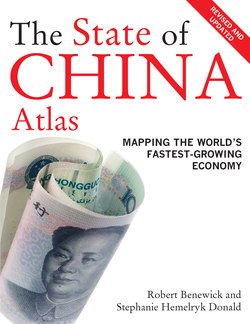Читать книгу The State of China Atlas - Robert Benewick - Страница 35
На сайте Литреса книга снята с продажи.
ОглавлениеThe entrepreneur, scion of the market-oriented economy, is fêted in popular self-help manuals and potted biographies in China’s bookshops. The re-organization and closures of state owned enterprises, the opening of China’s economy to foreign investment, and the large-scale privatization of housing has created opportunities for an “entrepreneurial class”. This group comprises both newly enriched entrepreneurs, and those who have used their business acumen and political connections to advantage in the reformed economy. Following Deng Xiaoping’s dictum “Get Rich First”, peasants moved out of grain production into specialist and luxury food production, or set up town and village enterprises. The area of land used for vegetable growing increased by 80 percent. Many of those who prospered became village leaders, chairing village enterprises management committees. The dictum “two classes, one stratum” no longer holds, as workers and peasant- farmers alike, but especially domestic migrant workers, are relegated to the bottom of the pile. Class divisions in China are stark. The urban rich are accumulating substantial wealth, while aspirational urban workers struggle to maintain access to costly services and housing. Meanwhile, the poor are caught in a cycle of deprivation. Their plight is exacerbated by the value of land, particularly for development and industrial farming. Increasing legal flexibility allows large enterprises to appropriate small plots, rendering their previous incumbents tenants, or landless. The State’s concept of “harmonious society” is designed to address the growing disparities amongst its people.
see also page 110
Copyright © Myriad Editions Limited
38
